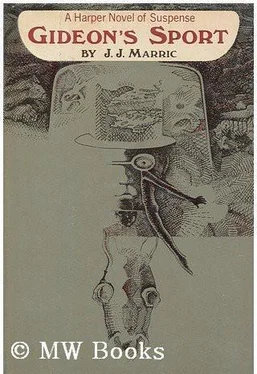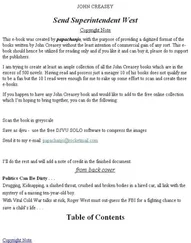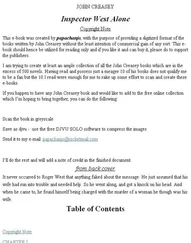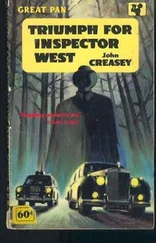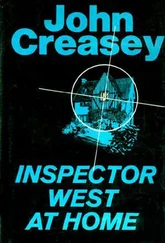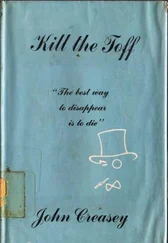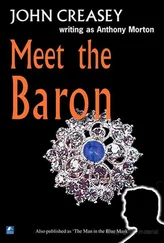John Creasey - Gideon’s Sport
Здесь есть возможность читать онлайн «John Creasey - Gideon’s Sport» весь текст электронной книги совершенно бесплатно (целиком полную версию без сокращений). В некоторых случаях можно слушать аудио, скачать через торрент в формате fb2 и присутствует краткое содержание. Жанр: Старинная литература, на русском языке. Описание произведения, (предисловие) а так же отзывы посетителей доступны на портале библиотеки ЛибКат.
- Название:Gideon’s Sport
- Автор:
- Жанр:
- Год:неизвестен
- ISBN:нет данных
- Рейтинг книги:4 / 5. Голосов: 1
-
Избранное:Добавить в избранное
- Отзывы:
-
Ваша оценка:
- 80
- 1
- 2
- 3
- 4
- 5
Gideon’s Sport: краткое содержание, описание и аннотация
Предлагаем к чтению аннотацию, описание, краткое содержание или предисловие (зависит от того, что написал сам автор книги «Gideon’s Sport»). Если вы не нашли необходимую информацию о книге — напишите в комментариях, мы постараемся отыскать её.
Gideon’s Sport — читать онлайн бесплатно полную книгу (весь текст) целиком
Ниже представлен текст книги, разбитый по страницам. Система сохранения места последней прочитанной страницы, позволяет с удобством читать онлайн бесплатно книгу «Gideon’s Sport», без необходимости каждый раз заново искать на чём Вы остановились. Поставьте закладку, и сможете в любой момент перейти на страницу, на которой закончили чтение.
Интервал:
Закладка:
There was silence, before Hobbs said: “That Spratt crew wouldn’t keep so quiet. They’re not worth anyone’s protection.”
Jacobus swung round, his eyes blazing, and cried: “How did you know it was Spratt? Who the hell told — ?” And then broke off, realising how completely he had been tricked.
CHAPTER TWENTY
Clean Sweep
At twenty minutes to five that afternoon, the South African captain turned a fast yorker from England’s most consistent bowler to the leg side, and two English fieldsmen raced for the red ball to try to cut it off from the boundary, and so save one, if not two, runs.
Until that moment, the scene was typical of Lords and as near idyllic as it could be. Here were the best cricketers England had, playing in the game which had been born not fifty miles from this spot; eleven men, bronzed from the bright summer, clad in white which showed stark against the emerald-green of the pitch and outfield — a green maintained by a miracle of groundsmen’s skill and patience. And there were two of their opponents from South Africa, a country which had inherited the game so long ago, and now could field a team on equal terms with England’s own.
Nearly thirty thousand people watched — as many as the ground would hold.
Every seat was filled. Every patch of grass between the front seats and the wooden boundary was filled, too; mostly with young boys. It was hot. Sellers of score-cards moved among the crowd in their constant quest for business, Around by the newly built Tavern, hundreds stood elbow to elbow, beer-glasses in their hands.
The stands had all been painted for this season, and despite the multitude, everything looked spick and span. Women in their gayest dresses, old and young men in their shirt-sleeves, watched the little red ball and the two men racing towards it and the other two running between the wickets — adding to a total already ominous for England: 163 runs for two men out. Every eye, save those upturned in drinking or down-turned while scraping the last taste of ice-cream from a carton, was directed towards the ball. So much energy, so much effort; almost as if life depended on it.
One of the fieldsmen stopped the ball with his foot. The other dived and picked it up, turned and threw it back towards the centre of the field, and there was a burst of eager applause.
That was the moment when a great number of spectators began to stand up — all young men and girls — in every corner of the ground.
The uprising began, obviously, on some prearranged signal. Those among the crowd used to the ways of spectators, thought no more than that these youths were stretching cramped legs-for this was the end of an over: a natural break in the game. But each of those who stood up took something from his or her pocket. Each was looking intently towards the field, and each was heading for a gangway, pushing unceremoniously past his neighbours.
Bligh, watching from the Members’ Stand, said to the Inspector with him: “Here it comes!” He looked in a dozen directions at once and his heart was racing, his words had a touch of breathlessness.
Here and there, innocent spectators called: “Sit down!”
None of the young men and women did so, but a few tossed smoke and stink-bombs at those who protested, and little bursts,of smoke and tiny clouds of evil-smelling gas began to waft in the gentle breeze. Coughing began, and shouts of protest, but no one in the middle of the field showed even the slightest interest. For this was England’s summer ritual and only heavy rains or rank disaster could affect the players on the field or interfere with the stately progress of the umpires.
As the demonstrators reached the gangways, older men sitting on the steps stood up. To the spectators, it must have looked as if the authorities had allowed the exits to be cluttered, and were now moving people on.
Not in one or a dozen but in hundreds of .places, exactly the same thing happened. The demonstrators, now obviously ready to invade the pitch from every corner of the ground, suddenly found their wrists gripped and firm pressure exerted — and then, amazed, found themselves heading away from, not towards, their goal! Most were too utterly astonished to put up a fight or even to protest. A few broke away and ran — only to find themselves confronted by policemen in uniform, delighted at this break in the routine business of crowd control. Perhaps a dozen demonstrators dodged clear of these and raced towards the gates only to find the police waiting outside them, with the Black Marias.
Over eight hundred and seventy persons were arrested on a charge of causing a public nuisance. Yet play was not interrupted even for a single over, and few in the crowd even guessed what had happened, before they heard about it on television and radio that night.
“Absolutely a clean sweep, sir!” Bligh almost crowed into the telephone. “Complete success, thank God!”
“Very well done,” Gideon told him, with heartfelt satisfaction. “Very well done indeed!”
“Excellent!” Sir Reginald Scott-Marie said. “I shall telephone the Home Secretary at once. I couldn’t be more pleased, George.”
Detective-Constable Conception sat up in her bed, her lips heavily sticking-plastered on one side. What food she was able to eat was in liquid form, and only through the other side of her mouth. She watched Charles Henry as he told her exactly what had happened at Lords; and when he had finished, there were tears in her eyes.
“And none of it would have been possible, but for you, Juanita,” he told her. “And George-I mean Commander Gideon — has recommended some official acknowledgement, so he understands . . .”
Lemaitre, at five o’clock that evening, was still feeling washed out, but much better than when Hobbs had come to get his report. It always irked him when he had to stay indoors, and now he was particularly anxious to talk to Gideon. His wife was out, and he put in a call to the Yard. Gideon wasn’t in his office, nor was Hobbs; so he spoke to Information.
“I can tell you one tiling,” the Information Chief Inspector told him: “Those two Americans you were after have flown back to New York.”
“Oh, hell!” exploded Lemaitre. He replaced the receiver resentfully, glared at it, picked up a glass of milk — prescribed by Chloe — sipped it, and then slowly drank it all. Then he went and put the finishing touches to the report he had prepared in New York. He was far from certain that he had a cast-iron case to present, and it was proof the Yard needed. When the telephone suddenly rang he was glooming about this; face wrinkled, brow furrowed.
“Lemaitre,” he growled; then realised that he wasn’t at his office.
“Hold on, please — Commander Gideon wants you.”
Lemaitre’s frown cleared, but his expression took on the lugubriousness of a Basset hound as he waited the few seconds before Gideon came on the line.
“Lem —”
“George,. I’m awfully sorry about this. I —”
“Never mind being sorry,” Gideon said, briskly. “Are you on>your feet?”
“Yes, I’m over the worst. Never let me have oysters —”
“We’ve all the evidence we need to arrest John Spratt on a charge of murdering Charlie Blake,” Gideon cut in. “It’s hard and fast, and I want him brought in this evening. If you’re not fit—”
“Just give me time to get my clothes on,” Lemaitre cried. “Just give me ten minutes!”
He could almost see Gideon smile.
He dressed with the meticulous care befitting so great an occasion, yet in less than fifteen minutes he was on his way to his Divisional headquarters. He arrived only five minutes before the evidence, which consisted of the two different pictures of the finger print taken from the envelope and one known for certain to be John Spratt’s. Within minutes, he had the back and sides of the converted warehouse covered, and took Superintendent Turpin and two detective-sergeants with him to the front entrance. The ground floor was still buzzing with activity; television screens showing pictures of horse-racing, Wimbledon and Lords; others flashing odds, cumulative betting totals and results. A startled manager said:
Читать дальшеИнтервал:
Закладка:
Похожие книги на «Gideon’s Sport»
Представляем Вашему вниманию похожие книги на «Gideon’s Sport» списком для выбора. Мы отобрали схожую по названию и смыслу литературу в надежде предоставить читателям больше вариантов отыскать новые, интересные, ещё непрочитанные произведения.
Обсуждение, отзывы о книге «Gideon’s Sport» и просто собственные мнения читателей. Оставьте ваши комментарии, напишите, что Вы думаете о произведении, его смысле или главных героях. Укажите что конкретно понравилось, а что нет, и почему Вы так считаете.
